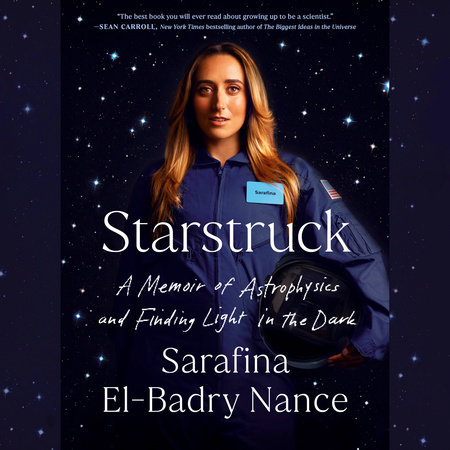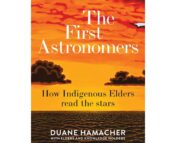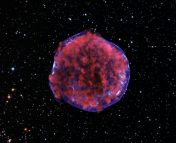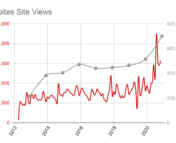By Briley Lewis and William Lamb
Content Warning: Domestic violence, childhood trauma, sexism, racism, cancer/illness, anxiety

Sarafina El-Badry Nance is a PhD student and astrophysicist at UC Berkeley. Somehow in the middle of her research, advocacy, and media work, she has found the time to write a book, Starstruck: A Memoir of Astrophysics and Finding Light in the Dark, about her journey and experiences thus far. Between short lessons at the beginning of every chapter on different aspects of stars, planets and the cosmos, she recounts her experiences of overcoming prejudice, abuse, and her own self-doubt to become the scientist she is today. As she is still quite young, this reads as a coming-of-age memoir rather than a reflective autobiography, focusing quite heavily on her formative years.
Nance’s journey begins with vivid childhood memories, both fondly remembered (like stargazing with her father) and traumatic (like confrontations with her mother). Growing up in Texas as an Egyptian-American, she was caught between the beauty of nature and the stars around her, and the daily struggles of racism and misogyny, anxiety, and a difficult family situation, as she worked towards her dream of becoming an astrophysicist. These challenges follow her as she grows up and progresses in her education.
As a reader, it felt like Nance experienced almost every possible trope that comes up when discussing diversity in STEM: a teacher who thinks girls can’t do math, casual racism from classmates, and the dreaded impostor syndrome. For a reader not familiar with these pervasive issues in science, this memoir is likely to be eye-opening—and for those of us working on inclusion in the field already, it’s all too familiar. She discusses the constant feelings of never being good enough and the uncontrollable worry that comes with an anxiety disorder, poignantly describing a panic attack by saying, “Of course you’re not actually dying. You’re living. But isn’t living the hard part?”
Some of the most heart-wrenching moments are when she discusses the interplay between her Egyptian heritage and the American political climate of the past few decades, showcasing the stark hatred shown towards Middle Eastern peoples after September 11th. She also shines a light on a lesser-discussed facet of the experiences of immigrant and international scientists: worries about family in other countries who are living through upheavals and disasters that often go nearly ignored in the United States. This memoir is certainly a momentous occasion for the representation of women of color in astronomy, particularly Middle Eastern scientists.
The strongest section of this book, though, is where Nance is at her most vulnerable, discussing her personal run-ins with cancer. Her father was diagnosed with terminal cancer, the second member of their family to contract the disease. This was a devastating development, and Nance’s love for her father makes her question: why was she still in graduate school and not with her father? Her thoughts are honest and heartbreaking, and she continued on with her father’s unfaltering support.
Given her family’s strong link with the disease and the finding of a (benign) growth in her breasts, she was tested for the BRCA gene mutation and discovered that she carries it too. The testing was traumatic and invasive, and it’s something that Nance would have to repeat every six months, just in case. At this point, she was given the choice of a preventative double mastectomy which would reduce her probability of getting cancer from 87% to just 5%. In this book, she chronicles her choice to do so, her challenges in finding a doctor, and her public journey through the mastectomy. She now continues to use her platform to support and advocate for women’s health, regular testing, and preventative medicine, to ensure that more women are empowered to make their own choices about their own healthcare.
Nance is quite obviously passionate about astrophysics; however, we would’ve loved it if she described her research more in this book. She has overcome so much, and it would’ve been very inspiring to read about and to celebrate her research and scientific achievements despite the difficulties and challenges that she faced. This would neatly connect with the brief lessons on the history of the universe that she opens with in each chapter, which otherwise felt somewhat disconnected.
This book is certainly inspiring in some ways, as Nance has overcome so many obstacles and retained her sparkling passion for space and for life. Yet, it also made us as readers simply sad at times. In a perfect world, society would address many of these systemic problems, so that staying in science doesn’t have to be about individual resilience and survival. Staying in science shouldn’t be harder just because of who you are and what your situation is. Someone should be in science because, like younger Sarafina, you’re curious about the cosmos.
We really look forward to seeing more from Sarafina in the future—maybe even a future autobiography that covers her continuing recovery, what she’s learned throughout her PhD, and the further positive impacts of her advocacy and her research.
In the short term, you can look out for an upcoming interview with her here on Astrobites, talking about what it was like to write a memoir as a graduate student!
Astrobite edited by: Katya Gozman
Featured image credit: Penguin Random House
Thanks to Sarafina Nance, Sarah Thegeby, and Dutton Books / Penguin Random House for providing an advance copy of the book for this review!




